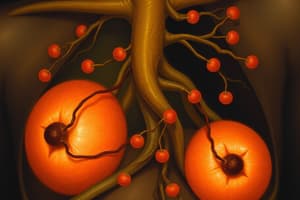Podcast
Questions and Answers
What are lymphocytes?
What are lymphocytes?
White blood cells central to the lymphatic system's immune functions
Where are lymphocytes produced and matured?
Where are lymphocytes produced and matured?
Produced in the bone marrow and mature in lymph nodes and the thymus
What is the role of lymph circulation in the body?
What is the role of lymph circulation in the body?
Transport lymph fluid throughout the body
What is lymph fluid composed of?
What is lymph fluid composed of?
What is the function of lymph nodes in the body?
What is the function of lymph nodes in the body?
Where are lymph nodes strategically placed in the body?
Where are lymph nodes strategically placed in the body?
What are the main functions of lymph nodes?
What are the main functions of lymph nodes?
Which cells within lymph nodes help in identifying and removing pathogens?
Which cells within lymph nodes help in identifying and removing pathogens?
What is the main function of lymphatic vessels?
What is the main function of lymphatic vessels?
Where are Peyer's patches found and what is their function?
Where are Peyer's patches found and what is their function?
What is the role of the spleen in the lymphatic system?
What is the role of the spleen in the lymphatic system?
Where is the thymus located and what is its function?
Where is the thymus located and what is its function?
Study Notes
Understanding the Lymphatic System
The lymphatic system is a vital part of our immune defenses, playing a crucial role in circulation, waste removal, and maintaining the proper balance of fluids in our bodies. This system is a network of tissues, organs, and vessels that operate in coordination with other bodily systems, especially the immune system.
Lymphocytes
Lymphocytes are white blood cells that are central to the lymphatic system's immune functions. They include B cells, which produce antibodies, and T cells, which help coordinate immune responses and identify infected cells to be eliminated. These cells are produced in the bone marrow and mature in lymph nodes and the thymus.
Lymph Circulation
The lymphatic system operates through a series of interconnected lymphatic vessels, which transport lymph fluid. Lymph fluid, also called lymph, originates from extracellular fluids and tissues. Lymph vessels pick up interstitial fluid and proteins that have filtered through blood capillaries, forming lymph. Lymph circulation moves lymph fluid through the body, eventually returning it to the venous system near the heart.
Lymph Nodes
Lymph nodes are bean-shaped structures that filter the lymph fluid, trapping bacteria, viruses, and other foreign substances. Each lymph node consists of a collection of lymphocytes, macrophages, and other immune cells. Lymph nodes are strategically placed throughout the body, particularly where lymph vessels gather. When lymph nodes become swollen, it is usually a sign of infection or immune response.
Functions of Lymph
The lymphatic system has several important functions:
- Immune defense: Lymphocytes and other immune cells within lymph nodes help identify and remove pathogens and infected cells.
- Waste removal: Lymph vessels collect waste and cellular debris, helping maintain the body's fluid balance and preventing swelling.
- Fat absorption: The lymphatic system aids in the absorption of dietary fats, known as lipids, by transporting them to the bloodstream.
Lymphatic System
The lymphatic system also includes various organs and tissues that play an essential role in the functions of the lymphatic system. These include:
- Spleen: This organ filters blood and removes old and damaged blood cells, while also producing antibodies.
- Thymus: Located in the chest, the thymus matures T cells.
- Peyer's patches: Found in the small intestine, these lymphoid tissues help protect the body from ingested pathogens.
In summary, the lymphatic system is crucial for immune defense, maintaining fluid balance, and transporting lipids. It consists of lymphocytes, lymph nodes, lymph circulation, and various organs that work together to keep our bodies healthy.
Studying That Suits You
Use AI to generate personalized quizzes and flashcards to suit your learning preferences.
Description
Explore the key components and functions of the lymphatic system, including lymphocytes, lymph circulation, lymph nodes, and related organs like the spleen and thymus. Learn about how this system contributes to immune defense, waste removal, and fat absorption.




